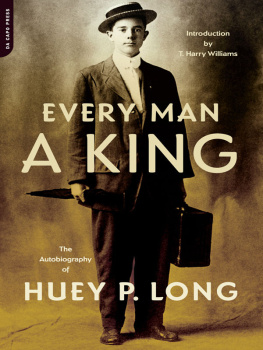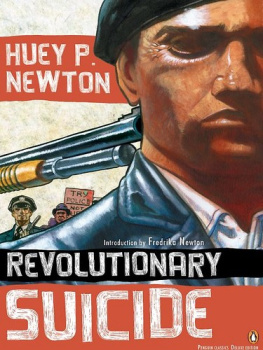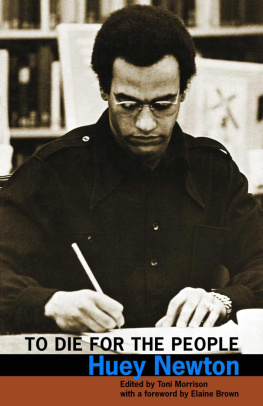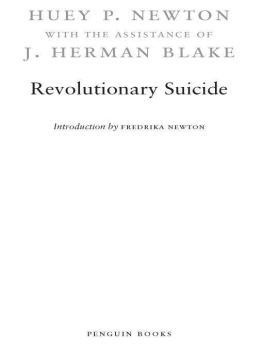Huey P. Long - Every Man A King
Here you can read online Huey P. Long - Every Man A King full text of the book (entire story) in english for free. Download pdf and epub, get meaning, cover and reviews about this ebook. year: 2008, publisher: Hachette Books, genre: Detective and thriller. Description of the work, (preface) as well as reviews are available. Best literature library LitArk.com created for fans of good reading and offers a wide selection of genres:
Romance novel
Science fiction
Adventure
Detective
Science
History
Home and family
Prose
Art
Politics
Computer
Non-fiction
Religion
Business
Children
Humor
Choose a favorite category and find really read worthwhile books. Enjoy immersion in the world of imagination, feel the emotions of the characters or learn something new for yourself, make an fascinating discovery.
- Book:Every Man A King
- Author:
- Publisher:Hachette Books
- Genre:
- Year:2008
- Rating:5 / 5
- Favourites:Add to favourites
- Your mark:
- 100
- 1
- 2
- 3
- 4
- 5
Every Man A King: summary, description and annotation
We offer to read an annotation, description, summary or preface (depends on what the author of the book "Every Man A King" wrote himself). If you haven't found the necessary information about the book — write in the comments, we will try to find it.
Every Man A King — read online for free the complete book (whole text) full work
Below is the text of the book, divided by pages. System saving the place of the last page read, allows you to conveniently read the book "Every Man A King" online for free, without having to search again every time where you left off. Put a bookmark, and you can go to the page where you finished reading at any time.
Font size:
Interval:
Bookmark:
A KING
The Autobiography of

Evangeiine Oak, St. Martlnville.
And it Is here under this oak where Evangeiine waited for her lover, Gabriel, This oak is immortal, but Evangeiine is not the only one who waited here In disappointment. Where are the schools, the roads and highways the Institutions for the disabled you sent your money to build? Evangelinee tears lasted through one lifetimeyours through generations. Give me the chance to dry the eyes of those who still weep here.Prom Bfaey P. Longs speech. Campaign, 1937-28.

EVERY MAN

KING
The AUTOBIOGRAPHY of

Introduction by T. HARRY WILLIAMS

Library of Congress Cataloging in Publication Data
Long, Huey Pierce, 18931935.
Every man a king: the autobiography of Huey P Long.
p. cm.
Includes bibliographical references and index.
Originally published: New Orleans: National Book Co., 1933.
ISBN 0-306-80695-9 (alk. paper)
eBook ISBN: 9780786723188
1. Long, Huey Pierce, 18931935. 2. LegislatorsUnited StatesBiography. 3. United States. Congress. SenateBiography. 4. GovernorsLouisianaBiography. 5. LouisianaPolities and government1865-1950. I. Title.
E748.L86A3 1996
95-42402
CIP
First Da Capo Press edition 1996
This Da Capo Press paperback edition of Every Man A King is an unabridged republication of the edition published in New Orleans in 1933, with the addition of an introduction by T. Harry Williams and an index reprinted from the 1964 edition. It is reprinted by arrangement with Russell B. Long, Palmer Long, and Christopher R. Brauchli.
Copyright 1933 by Huey P. Long
Renewal copyright 1961 by Russell B. Long
Introduction 1964 by T. Harry Williams
Published by Da Capo Press
A Member of the Perseus Books Group
http://www.dacapopress.com
All Rights Reserved
Manufactured in the United States of America
11 12 13 14 15 16 17 18 19 20
Ill fares the land, to hastening ills a prey,
Where wealth accumulates and men decay
GOLDSMITH
In August, 1933, George R. Allen, a newspaper man who did public relations work for Senator Huey P. Long, wrote an interesting letter to the Louisiana leader. Allen had been able, he said, to persuade the North American Newspaper Alliance to run an article in its syndicated service extolling Longs program in Louisiana. But the editor of North American, to maintain a pretense of neutrality, had insisted that Allen prepare also an anti-Long article to appear first. Allen had readily agreed. In the first article I will give the opposition their day, he told the Senator, and in the second I will knock it into a cocked hat.
Long was duly appreciative of Allens artistry. Few American politicians have had as shrewd and as sensitive a regard for the uses of the printed word as this apparently unlettered man who burst so explosively on the national scene in the 1930s. His knowledge of the techniques of public influence was uncanny and apparently instinctive. It came into play when he ran for his first political office at the age of twenty-four and was constantly enlarged and refined thereafter. In that initial race he hit on the device of putting his cause before the voters through the medium of printed circulars which he tacked on trees and poles all over his district. He continued to use the circular mechanism throughout the rest of his career, in his races for governor and United States Senator, and to popularize his policies after winning power. It has been estimated that between 1928 and 1935 some 26,000,000 of these documents were distributed all over Louisiana. Longs circulars were no mere abstracts that shrilled forth a few biased sentiments. They were, naturally, partisan and slanted, but they were lengthy compositionsan average product would run from 1,000 to 1,800 wordsand they were packed with political and economic information.
They were also extremely well written. Long wrote the copy for every circular or, if he was busy with other matters, sketched out to a subordinate the points he wanted made. It was not just that he was intent on presenting the most effective case to the public. This man who seemed to be purely political had a real interest in literary exposition and an itching desire to represent himself in print. Many of his intimates have opined that if he had not been a great politician he might have been a great actor or preacher. It is very possible that he might have been, if not a great writer, at least a talented one. He constantly sought to create media for the expression of his writings. After he became governor he founded his own newspaper, the Louisiana Progress, which became, when he went to the Senate, the American Progress. It was a weekly, although sometimes irregular in appearance, and for years Long contributed a column to it. Often the column was only an excerpt from one of his Senate speeches, which were his own compositions, but just as often it was something special he had taken time to put together. He also wrote some articles about himself for the popular magazines.
But, like every aspiring writer, he wanted above all to enshrine his name in the most enduring form of publicationbooks. And the name Huey P. Long appears as the author on the title pages of three volumes. His part in the preparation of the first one published was, however, only nominal. Constitutions of the State of Louisiana appeared in 1930. It was a comparative compilation of the various constitutions from 1812 to 1921, relating articles in the earlier documents to the 1921 version. Most of the actual work seems to have been done by a lawyer friend, aided by assistants assigned by Long, although Long, a master of legal lore, could well have done the job himself if he had not been in the turmoil of his governorship. The purpose behind the project was to enable Loyola University to grant him an honorary degree. A solid piece of scholarship, the book became a widely used reference tool in Louisiana.
In the fall of 1932, after he had taken his Senate seat and already had become a national figure, Long decided to write his autobiography. He began work on it almost immediately and continued intermittently until the task was completed in 1933. Necessarily, because of the press of Senate duties, Long had to get away to New Orleans or Baton Rouge to do his composing. He dictated the whole manuscript, utilizing several secretaries and often striding up and down the room and acting out some episode he was describing. He did a lot of revising and rewriting, and finally, after having his newspaper friend Allen read the finished draft, he made a last revision. The book appeared in October, 1933, approximately a year after its conception. The title, Every Man a King, was drawn from a slogan that Long had employed in his campaigning and that he would later use as the name for a campaign song. (His literary activities included the writing of words for songs to which a more musically inclined friend put the notes.)
Font size:
Interval:
Bookmark:
Similar books «Every Man A King»
Look at similar books to Every Man A King. We have selected literature similar in name and meaning in the hope of providing readers with more options to find new, interesting, not yet read works.
Discussion, reviews of the book Every Man A King and just readers' own opinions. Leave your comments, write what you think about the work, its meaning or the main characters. Specify what exactly you liked and what you didn't like, and why you think so.









